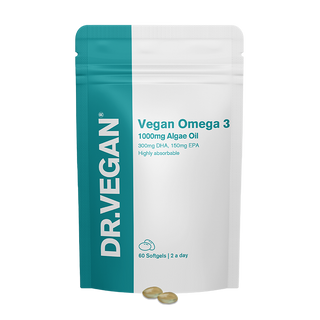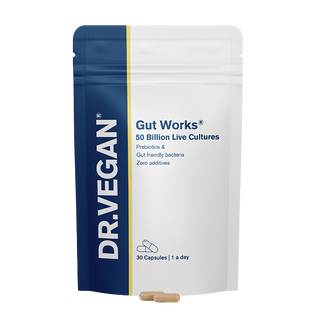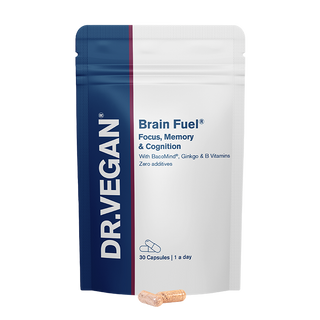14 common signs of ADHD

ADHD is estimated to affect up to 4% of the population, with a male-to-female ratio of approximately 3:1. However, the real number of people with some level of ADHD is thought to be much higher, given that most people won't receive a diagnosis. ADHD expert and nutritional neuroscientist Dr. Gow, explains ADHD, the causes and symptoms of ADHD, the role of the vagus nerve in ADHD and provides her recommendations to support your brain health. Dr. Gow (BSc, MSc, PhD, RNutr) is also a Child Neuropsychologist and Registered Nutritionist, and has also written about the relationship between ADHD and menopause.
What is ADHD?
Most people have heard of ADHD; however, few will be able to articulate exactly what it is. Essentially, ADHD is a neurobiological condition that can be described as subtle differences in the wiring of the brain that give rise to a range of behaviours and learning differences, often referred to as 'neurodiversity' (deviating from neurotypical behaviour). The core symptoms of ADHD in children are age-inappropriate behaviour marked by inattentiveness (which is often coupled with disorganisation and distractibility), hyperactivity as well as impulsive and reactive actions.
ADHD and the vagus nerve
The vagus nerve (which means 'wandering' in Latin) is the longest cranial nerve in our body and acts as a modulator of the parasympathetic nervous system, starting at the brain stem at the back of our neck and running all down into the gut.
What's your diet missing? Find out in your free Diet Profile.
The vagus nerve helps the body achieve something called 'homeostasis', which is a state of balance required by the body for survival purposes, through the implementation of positive and negative feedback signals between the endocrine and nervous systems by way of the hypothalamus. These systems and glands can be summarised as follows:
- The hypothalamus is an almond-sized structure in the brain that links the nervous system to the endocrine system.
- The endocrine system is a series of glands that produce chemicals and hormones and play a critical role in the body’s metabolism.
- The thyroid and adrenal glands are key glands in the human body and alongside organs including the heart, kidney and liver, they play a role in the endocrine system. Discover the best tips for an underactive thyroid from our nutritionists.
The vagus nerve can be thought of as the regulator of the gut-brain axis and can be modulated to assist in reducing stress and anxiety through practices including meditation, breathing work and yoga. In clinical practice, many clients (both adults and children) who are diagnosed with ADHD also present with gut health disturbances and symptoms linked to a condition called 'gut dysbiosis'. The presence of these symptoms is largely the result of the gut-brain axis, which is why a healthy gut is so important for mental health and brain function. Learn more in 'The Gut-Hormone Connection Explained'.
In addition, it is common for people diagnosed with ADHD to also present with a range of nutritional insufficiencies, food intolerances (such as gluten intolerance) and the presence of a gut microbe called 'Candida albicans', which can be discovered in stool tests. Your poo can tell you a lot about your health. 'Candida albicans' is an organism that can influence the permeability of the intestinal lining and increase the risk of dysbiosis. Dysbiosis is also known as 'leaky gut syndrome' or 'fungal mycobiome dysbiosis'. The link between ADHD and intestinal inflammation has implications for the brain and behavioural disturbances.
Origins and causes of ADHD
There are several decades of neuroscientific and imaging research demonstrating differences in brain activity and functionality among people diagnosed with ADHD. Genetic studies also support the notion that ADHD traits are highly hereditary, with estimates that around 76% of the condition may be accounted for by our genes (DNA).
However, there is no such thing as an 'ADHD gene'. The molecular genetic literature for ADHD has identified a modest number of genes called 'copy number variants'. 'Copy number variants' are genetic variants that are simply modifications in DNA and genetic variants include insertions, deletions or duplications of segments of DNA. Genes do not work in isolation and there is always a complex interplay between our genes and the environment. An increasing number of studies are proposing that ADHD is likely an epigenetic manifestation. Epi simply means 'on top of the gene' and refers to environmental factors such as nutrition and diet, which can modify and change gene expression at transcriptional levels. However, these studies are still inconclusive.
Adult ADHD
There are around 2.6 million people in the UK diagnosed with ADHD. ADHD is often described by people who have it as a type of invisible condition that can serve as both a gift and a curse. ADHD is not overdiagnosed, even though it may appear to some that more and more people are being diagnosed with it. Fortunately, ADHD is finally being talked about more in the media and across social media platforms.
In addition, there are an increasing number of studies into natural ingredients that can help address the symptoms of ADHD. One such study in children with ADHD showed that BacoMind®, a patented form of Bacopa monnieri, can help improve memory recall by 24%, reduce the impact of memory disturbance by 50%, and improve delayed memory recall by 78% when taken daily for 12 weeks. BacoMind® is one of the key ingredients in Brain Fuel®, a unique formula to support your brain's focus, concentration, and memory.
14 common symptoms of ADHD
The most common symptoms of ADHD are:
- Procrastination
- Distraction
- Mind-wondering
- Disorganisation
- Forgetfulness
- Overcommitment
- Impulsive behaviour
- Tendency to self-medicate
- Addictive behaviour
- Little or no filter, i.e., will say what comes to mind without appreciation of the timing or appropriateness
- Creatively engaging in lots of projects
- Struggle to follow through
- Restless behaviour
- A higher tendency towards depression or anxiety
You may be interested in learning about BacoMind®, found in DR.VEGAN'S nootropic formula, Brain Fuel®. Read everything you need to know about nootropics.
Omega 3 for the brain
The brain is the fattiest organ in the human body. At least 65% of the dry weight of the adult brain and retina is made of specialised and complex fats called 'lipids' and around 25% of the brain's cells are made of omega 3 fats. One of the singularly most important omega 3 fats present in the brain is 'docosahexaenoic acid', also known as DHA.
DHA is a highly unsaturated essential fatty acid that can be gained in our diet through eating fish and seafood or by taking supplements like DR.VEGAN'S Vegan Omega 3, which contains 1,000mg Omega oil and provides the optimal dosage of 300mg DHA and 150mg EPA per serving. DHA is vital for communication (neurotransmission or cell signalling) throughout the brain’s networks. It is because so few people gain sufficient omega 3 fats through their diet that taking an Omega 3 supplement is very commonly recommended.
Each of the neurons in our brain contains an axon that passes messages away from the cell body to other neurons. These send an electric signal, or pulse, which travels down the axon. Each axon is covered in a fatty sheath called 'myelin', which is made up of DHA. This brain-essential fat helps speed up cell signalling, resulting in faster and more efficient communication across our brain networks. Without adequate daily intakes of DHA, the chemical messaging process is less efficient and slower, impacting our ability to think, make decisions and solve problems. Learn more about why Omega is so good for you.
Hydration and the brain
It is really important to monitor your water intake for optimal brain health because water makes up around two-thirds of our body composition and around 80% of our brain. Water delivers nutrients to the brain and also removes toxins. Staying hydrated helps with cognitive performance and mental alertness. Water also helps keep your mood in check, helping you stay focused and stay on task.
Adults should be drinking, on average, at least 2 litres a day. Buy a sports bottle and sip water throughout the day. Filtered or mineral water is preferable to any sugary drinks or additives. You should also avoid ultra-processed powder supplements that mix with water which contain sweeteners - learn more in 'Exposed: Plant sweeteners and Type 2 diabetes'.
Nutrients required by the brain
Certain nutrients are 'brain-selective', which means they play a critical role in brain (or mental) health, wellbeing, cognitive function and mood, and it's important these are in your diet. You can read more about these in the book, Smart Foods for ADHD and Brain Health.
We need to eat smart to keep depression and anxiety at bay and there are certain foods that can optimise mood and wellbeing. A sizeable body of published research has demonstrated that specific deficits in certain nutrients are associated with an increased risk of depressed mood. These nutrients include low levels of omega 3 fatty acids, zinc, magnesium, B-vitamins and Vitamin D.
Vegan Omega 3

B-vitamins, folate, pyridoxine (Vitamin B6) and methyl-cobalamin (Vitamin B12), are considered to be protective against the development of depression. B-vitamin-rich foods include dark green leafy vegetables such as kale, spinach, broccoli, wholegrains such as brown rice, sunflower seeds, almonds, beans and lentils. B vitamins also help facilitate the synthesis of neurotransmitters implicated in mood regulation, including the regulation of serotonin, dopamine and norepinephrine.
Omega 3s have important anti-inflammatory and neuroprotective roles, which may also contribute to their anti-depressant effects. A study by Hallahan and colleagues published in The British Journal of Psychiatry found that intervention with Omega 3, EPA-rich formulations resulted in significant reductions in symptoms of clinical depression, with an effect greater than that of anti-depressants and cognitive behaviour therapy when taken alone and combined.
The best nutrients for neurotransmission
Making sure you include certain foods in your diet can help boost both serotonin and dopamine production. These include:
- Omega 3-rich foods, including avocados and walnuts.
- Dark chocolate (above 80% cacao) is known to increase serotonin and boost dopamine production.
- Kale contains Iron, Folate and Vitamin B6, all of which are needed to make serotonin and dopamine.
- Spinach contains folate, which is vital for dopamine production.
- Raw nuts, including almonds help stabilise blood sugar levels, keep hunger at bay and help increase serotonin.
Managing ADHD through diet
ADHD symptoms can be managed to an extent through adopting a healthier diet and lifestyle. This includes:
- Eating whole foods, including those found in the Mediterranean diet, a wide variety of vegetables, salads, fruits, nuts and seeds, extra virgin olive oil.
- Restricting or eliminating processed foods, junk food and avoid sugar.
- Exercising on a daily basis, even just for 30 minutes per day.
- Practicing stress reduction techniques.
- Avoiding alcohol and quitting smoking.
- Avoid artificially manipulating dopamine (the neurotransmitter linked to reward and pleasure) through gaming and social media.
Studies show that people with ADHD are more likely to develop an addiction and it often starts during childhood with problematic eating and the development of a sugar addiction. You may be interested in reading about the impact of plant sweeteners on your health and '6 big signs of stress'.
About Dr. Rachel V. Gow
Dr. Rachel Gow works in a field called Nutritional Psychiatry or Nutritional Neuroscience, which is concerned with a personalised holistic approach to brain health.
Dr. Gow is a neuropsychologist, a registered nutritionist, the founder of Nutritious Minds and the author of Smart Foods for ADHD and Brain Health. Her key area of specialisation is ADHD, autism and other neurodevelopmental conditions. Dr. Gow believes that the future of medicine must move beyond the prescription pad and behavioural descriptions of mental health by assessing biological markers, which are known to be critical for the health and function of the human brain at molecular and cellular levels.
Rachel's private clinic assesses for nutritional insufficiencies in key nutrients that help facilitate neurotransmitter function and tests for a wide range of food intolerances and allergies that could be impacting gut health and, in turn, brain health (known as the gut-brain axis). Microbiome analysis, which involves a stool test, can reveal the composition and diversity of microorganisms present in the gastrointestinal tract and identify associations between how these markers correspond to the individual’s dietary patterns and psychological health. There are specific tests that can measure the presence of inflammatory cytokine levels, which is important given the global consensus in the field of nutritional psychiatry that underlying much of all mental (or brain) health conditions is inflammation.
The gut-brain connection alongside vagus nerve functioning determines a range of significant bodily functions linked to mood regulation, the control of heart rate, our immune response and so much more. Hence, anyone presenting with poor mental health should first look at the health of the gut and critically consider what they eat and drink.
Nutritious Minds Clinic
Nutritious Minds adopts a personalised, integrative approach to brain (or mental) health that enables prescriptive dietary modifications and, where appropriate, the use of nutrient-based supplements to optimise brain function at molecular and cellular levels, reduce inflammation and help regulate neurotransmitter activity, including those that govern mood, namely serotonin and dopamine. The approach is integrative, including prescriptive exercise, gut-health modifications, sleep-promoting advice, coaching and lifestyle advice, meditation and other health-promoting activities.
You may also enjoy reading:
- Mushrooms and brain health
- Brain fog: how to clear the mental haze
- Adaptogens that can change your life
Want to hear more from our nutritionists? Sign up to our email newsletter for insights and exclusive offers:
References- Monastero RN, Pentyala S. Cytokines as Biomarkers and Their Respective Clinical Cutoff Levels. Int J Inflam. 2017;2017:4309485.
- Matteoli G, Boeckxstaens GE. The vagal innervation of the gut and immune homeostasis. Gut. 2013;62(8):1214-22.
- Rangon CM, Niezgoda A, Moyse E, Porges SW. Editorial: Vagus nerve-mediated drive in supporting homeostasis: optimizing global health through monitoring and stimulating vagal function. Frontiers in Physiology. 2023;14.
- Pavlov VA, Tracey KJ. The vagus nerve and the inflammatory reflex--linking immunity and metabolism. Nat Rev Endocrinol. 2012;8(12):743-54.
- Breit S, Kupferberg A, Rogler G, Hasler G. Vagus Nerve as Modulator of the Brain-Gut Axis in Psychiatric and Inflammatory Disorders. Front Psychiatry. 2018;9:44.
- Wang L-J, Li S-C, Yeh Y-M, Lee S-Y, Kuo H-C, Yang C-Y. Gut mycobiome dysbiosis and its impact on intestinal permeability in attention-deficit/hyperactivity disorder. Journal of Child Psychology and Psychiatry. 2023;64(9):1280-91.
- Rubia K. Neuro-anatomic evidence for the maturational delay hypothesis of ADHD. Proc Natl Acad Sci U S A. 2007;104(50):19663-4.
- Shaw P, Eckstrand K, Sharp W, Blumenthal J, Lerch JP, Greenstein D, et al. Attention-deficit/hyperactivity disorder is characterized by a delay in cortical maturation. Proc Natl Acad Sci U S A. 2007;104(49):19649-54.
- Gow R, Bremner R, Lustig R. Smart Foods for ADHD and Brain Health: How Nutrition Influences Cognitive Function, Behaviour and Mood: Jessica Kingsley Publishers; 2021.
- Spedding S. Vitamin D and depression: a systematic review and meta-analysis comparing studies with and without biological flaws. Nutrients. 2014;6(4):1501-18.
- Hallahan B, Ryan T, Hibbeln JR, Murray IT, Glynn S, Ramsden CE, et al. Efficacy of omega-3 highly unsaturated fatty acids in the treatment of depression. Br J Psychiatry. 2016;209(3):192-201.
- Robbins TW. ADHD and Addiction. Nature Medicine. 2002;8(1):24-5.
- Kalbag AS, Levin FR. Adult ADHD and Substance Abuse: Diagnostic and Treatment Issues. Substance Use & Misuse. 2005;40(13-14):1955-81.
- Johnson RJ, Gold MS, Johnson DR, Ishimoto T, Lanaspa MA, Zahniser NR, et al. Attention-deficit/hyperactivity disorder: is it time to reappraise the role of sugar consumption? Postgrad Med. 2011;123(5):39-49.
- Gilfarb RA, Leuner B. GABA System Modifications During Periods of Hormonal Flux Across the Female Lifespan. Frontiers in Behavioral Neuroscience. 2022;16.
- Gonon F. The dopaminergic hypothesis of attention-deficit/hyperactivity disorder needs re-examining. Trends Neurosci. 2009;32(1):2-8.
- del Campo N, Fryer TD, Hong YT, Smith R, Brichard L, Acosta-Cabronero J, et al. A positron emission tomography study of nigro-striatal dopaminergic mechanisms underlying attention: implications for ADHD and its treatment. Brain. 2013;136(Pt 11):3252-70.




















